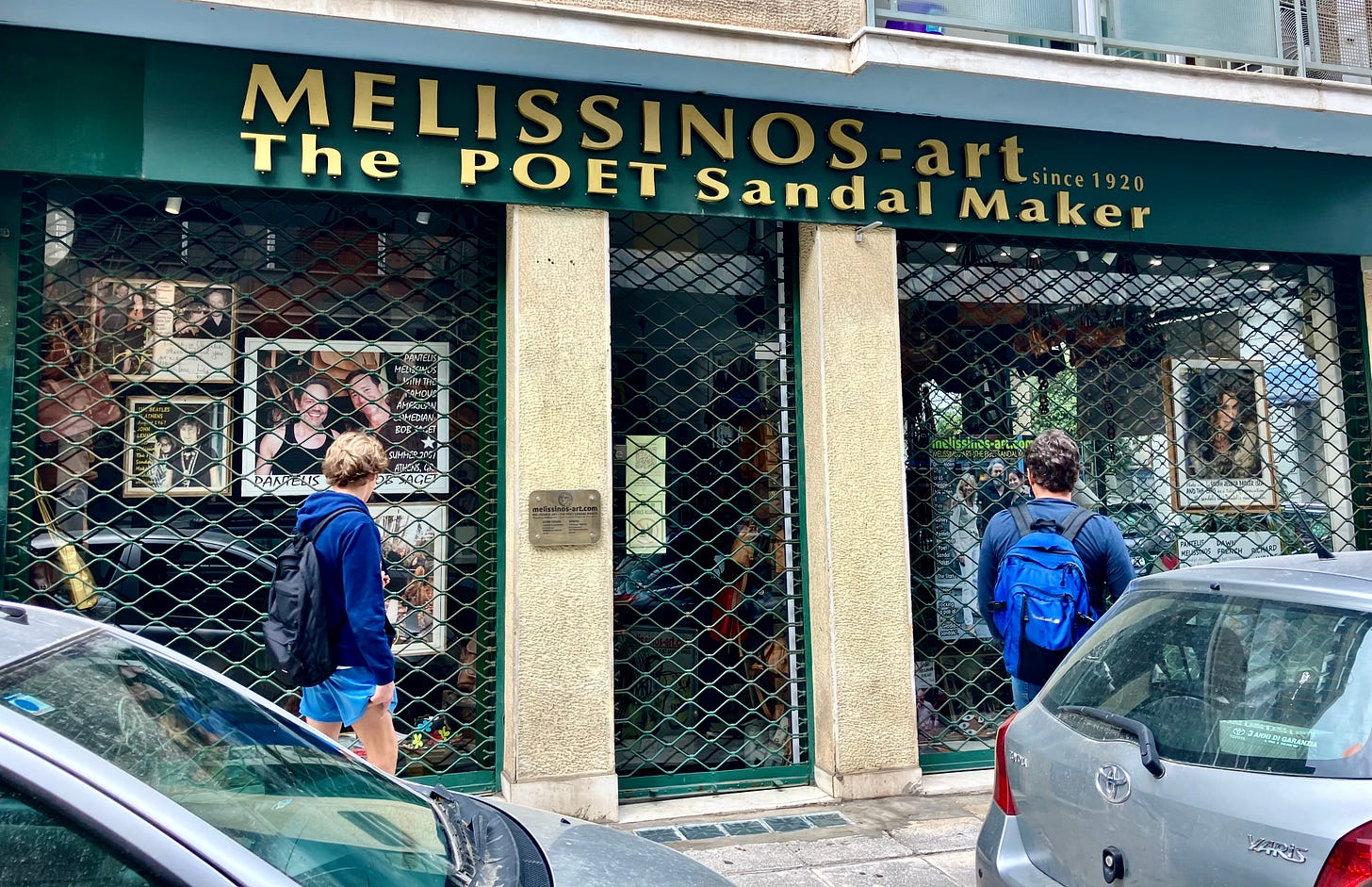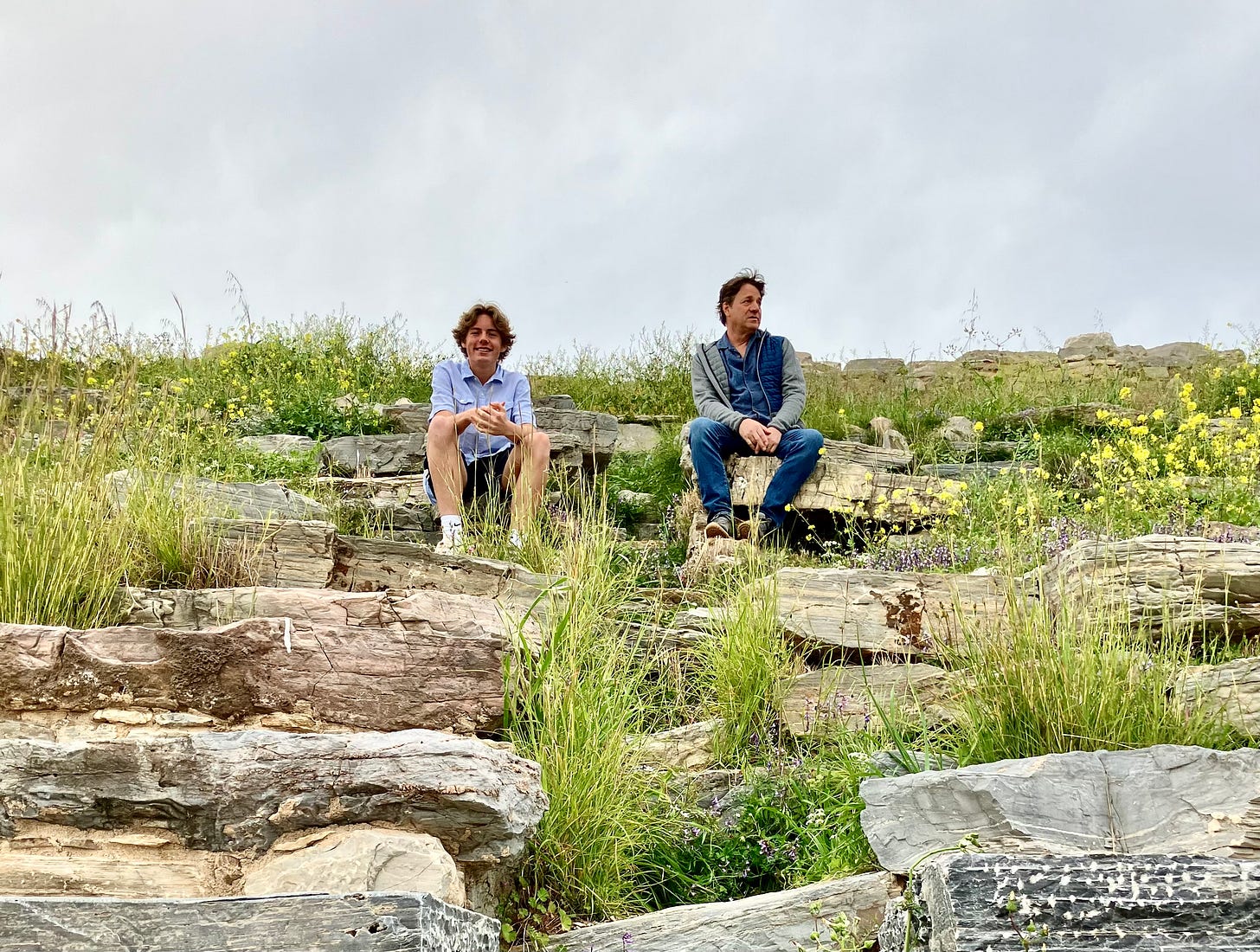The Luxury of Being There
Why budget travel is more about mindset than numbers . . . but also some astonishing $$ numbers from our family trip to Greece
Budget travel is a wildly relative concept. I remember opening a glossy budget travel magazine back in the 90s. Its recommendations for gallivanting around the world struck me as just a notch below oligarch-style. Wow, I thought, budget travel is way too posh for me.
Soon I discovered another popular take on budget travel: roughing it as a backpacker. Grabbing a bare-mattressed top bunk in a hostel dorm that sleeps 16; eating day-old pastries for lunch. Valuable experience, though it becomes a little too rough for most of us at some point.
International travel was so long a luxury, especially for U.S. residents, that certain outmoded notions may still shape our approach to travel even when we do it more cheaply. Underlying much budget travel is a belief that expensive is always better and cheaper always entails compromise. In some ways, our understanding of travel hasn’t evolved much since the Titanic days when there was one way to get across the big pond and our only options were first, second, or third class.
But what if a less expensive travel option is our preferred one? Not an austerity measure. A choice.
When I tell someone how little I’ve spent on a family trip, they often respond with confusion or disbelief. It finally dawned on me that my budget travel doesn’t always add up for others because it involves an alternative mindset. I’m all about the luxury of being there.
Sounds kind of pompous, maybe. Stick with me.
This alternative mindset came after much experience. Reporting has enabled me to travel quite a bit. 95% of my international travel has been on assignment, which means I didn’t pay for it myself: flights, accommodation and some or all meals were covered. Certain press trips also involved gratis luxuries like central five-star hotels, private or special access to various spaces and activities, and sumptuous meals at Michelin-starred restaurants. This experience gave me the enormous privilege of testing conventional luxury without any personal outlay. For free I learned what was or wasn’t worth the money.
Here are some elements of my budget travel mindset.
Note: The dollar has fallen since Trump’s tariffs hit. When we were in Greece last month, the dollar and euro were still close enough that we didn’t even bother with conversions.
Seizing opportunities to travel cheaply
I needed to do some work for an editing client in Greece. With low expectations, I searched for airfares to Athens during my son’s Spring Break. A new Turkish Airlines route from Denver had $453 airfares to Athens via Istanbul in late March.
This sweet deal was nevertheless a considerable expense for my low-income family. If I went to Athens alone, I’d make money. If I went with my husband and son, even with my flight, our accommodation, and my daily expenses covered by work, we’d probably spend a little more than I’d make. But the thirteen-year-old will only be home with us for five more years. Our family travel days are numbered. I couldn’t pass up such an affordable opportunity for my erstwhile Percy Jackson reader to experience all those mythological sites in real life.
Preferring the freedom of less expensive destinations
Almost any place can be affordable with some planning, but relentless ducking and weaving around high costs wears me out on a trip. In New York City or Oslo, if an activity runs long and my family of three has to grab dinner without advance research, we could stumble into a restaurant where our meal comes to 350 USD. Budget blown.
I’d rather spend time in a place where I can be spontaneous without breaking the bank. The mindset: I’ve come to prefer the ease and flexibility of less expensive destinations. They’re more fun to visit.
Traveling in the off-season
This common advice deserves special consideration in these times. Summer air travel now involves such frequent delays and cancellations that many seasoned traveler friends avoid flying in the summer months altogether. In some parts of the world, heat waves increasingly make being outdoors unpleasant or even dangerous in the summer.
My son’s Spring Break, which is the only time we could travel as a family this year, fell during Greece’s off-season when the country is not so crowded, pleasantly cool, and less expensive. From November 1st to March 31st, admission is roughly half-price at many spots, including the Acropolis (10 euros) and Athens’ National Archeological Museum (6 euros). I’d guess many of our costs were half of what they’d be in June, July, or August.
Downside: In March, the Aegean Sea is a little too cold for swimming. For normal people. Swimming lunatics like me don a neoprene cap in brisk water and go the distance anyway.
Staying in residential neighborhoods
This is a vital mindset adjustment for affordable travel.
Conventional wisdom says travelers should stay in the nicest central hotel they can manage. Unless I’m covering events in a city center and need to be out day and night, I prefer short-term rentals in residential neighborhoods adjacent to the main action. Besides usually being more affordable, these areas are calmer and friendlier, offering a sense of local life. (I’m sensitive to how short-term rentals can affect residents; this trend affects my own Colorado neighborhood.)
In Athens, rather than staying near the Acropolis in Plaka or Monastiraki, we got a short-term rental in the Pangrati/Mets neighborhood near the Olympic Stadium, an area that reminded me of South Park Slope in the late 90s. The walk to the Acropolis from our rental was just under a mile. Our accommodation was covered by my assignment but I’ll tell you, dear reader, that it was only 78 USD/night for a comfortable two-bedroom apartment with a nice kitchen, washer & dryer, and generous balcony. A place we all loved.
The mindset: understanding lodging in a slightly out-of-the-way residential neighborhood not as some sad compromise but as the better option for me. It’s always worth considering how we’d like to experience a place. The most expensive choice is not necessarily the best.
Not eating three full meals a day and eating like locals
On our first morning in Athens, the 13-year-old and I walked a couple of blocks from our rental to a local bakery in Varnava Square. We asked everyone in line what we should buy. A passionate debate ensued among the locals before they settled on a few recommendations: chicken pie, spinach pie, and sweet bougatsi. The bakery cashier upsold us on a large square of feta quiche, too. This amounted to an enormous quantity of food, two full meals for the three of us.
The cost: 10.2 euros, or about 11 USD.
We were in a country where good food is such a fundamental human right that we didn’t have to worry about its cost. This held true throughout the trip: Even a fancier business lunch in Athens only set me back 24 USD.
Another huge factor in budget travel is approach to eating. The mindset: Anyone who eats three full meals a day at home may need to do the same while traveling—and will pay for it. But many of us don’t. On a trip, I want two things from food: to sample every great thing I see all day long and to savor long, slow meals where I have a chance to digest some of my travel experiences along with the food.
For a grazing-all-day experience, sharing works well. At Athens Central Market, the three of us split two incredible pork souvlaki at Volvi (2.50 each) and later a plate of fried fish for 5 euros. Beers were 2 euros. Greek yogurt drizzled with honey set us back 3 euros. We rarely eat out at home, so grazing was hella fun for us.
In the long, slow, one-big-meal-a-day category, we had a decadent two-hour lunch at local favorite Mavro Provato, where we ordered six plates to have meze-style, plus wine. Total cost: 53 euros for the three of us. Like most restaurant food, this was rich in satisfying fats, so one meal there was enough.
The grazing-all-day or one-big-restaurant-meal-a-day strategy only works if we stock our short-term rental with coffee, snacks, and drinks. My growing 13-year-old son needs to be able to make a sandwich when he’s hungry.
On eating like a local. At the nearest grocery store, I noticed a well-dressed woman with a bottle of red Greek wine in her basket alongside fresh vegetables and nice cheese.“Our favorite everyday wine,” she told me. It was 5 euros a bottle and surprisingly well-balanced. One sunny morning we came across our neighborhood’s Pangrati Farmer’s Market. Athenians were stocking up on fruits and vegetables, herbs, olives, and honey at budget prices. A vendor sampling fruit handed me a wedge of the sweetest, juiciest orange I’d ever had. I asked him where the orange was from. He shrugged. I bought eight of these oranges of no known origin for 1.50 euros. 4 euros got me a bag of mixed olives so large we weren’t able to finish it in a week.
After a long day of wandering that includes a big, delicious lunch out, luxury for me is not having to go to dinner at all. It’s sitting on my Athens balcony at sunset having an orange and some olives with a glass of wine while I read a novel.
Not trying to do it all. The luxury of being there.
Cramming every waking hour with activity can be tempting on a trip. You may never be in that place again. Yet overbooked days and nights are not only expensive but exhausting.
The mindset: For me, luxury is having time to browse in a bookstore for an hour, chatting up its owner. Or sit in a plaza watching the world go by. A good part of my entertainment overseas is simply walking, biking, or swimming around a place. One major museum or monument visit a day is enough for me.
The ultimate luxury is taking time off in the middle of a trip. When I was busy working one day, my husband and son hung out in the neighborhood, walking laps around the Panathenaic Stadium and hitting the local basketball court for a pickup game in which my son navigated some interesting cultural differences. On this relaxed day, we spent only 27 euros at Mailo’s, a handmade pasta takeout joint, and otherwise enjoyed food at our rental. We had a long family chat, taking the time to process some of our many experiences before we headed out the next day for more.
Not doing too much also leaves funds for desirable bigger-ticket items. Visiting the island of Hydra cost 200 euros for three round-trip ferry tickets. It was well worth it.
Skipping the souvenir shopping
Anyone who loves shopping should of course prioritize it while traveling. Sometimes I shop overseas. On my first trip to Rio, for example, I picked up some Brazilian CDs that I couldn’t get back home.
The mindset: Souvenir shopping isn’t mandatory while traveling. Shopping well usually requires research and browsing hours that I’d rather spend otherwise. Freedom for me is walking past shops and settling into a sunny cafe to talk with locals instead. Again, it’s worth reflecting on whether shopping on a trip is something we truly enjoy or are simply conditioned to do.

Not worrying about “doing it right”
Americans have particular anxiety about doing international travel right. Maybe the distance we travel to get overseas creates weighty expectations. Maybe it’s our fear of being that most maligned of travelers: The Ugly American.
After a family-work trip to Rome (on which I earned more than we spent) a couple of years ago, someone said, “You went nowhere else in Italy for a whole week? My friend went all over Italy, France, Spain, and Portugal in three weeks. I’m waiting until I can do it right like that.”
Setting aside the dubious value of a mad dash through multiple countries, what if this person never has the time or funds to do exactly what their friend did? The notion of doing it right can shut down other wonderful possibilities. Too much rigidity around traveling can prevent us from going anywhere at all.
NB: If you must know—and you must, because you’re a curious person—doing it right in Greece would involve chartering a yacht and sailing close friends and family to a few of the country’s sun-drenched ports for all of September and October when daily highs are comfortable and the sea is still warm.
My inability to realize this lofty travel vision certainly didn’t stop me from enjoying Athens and surrounds with my family of three for eight days in March.
Disclaimers and total costs
I don’t always prefer the more frugal choice. Don’t get me started on that one press trip where I came off a long-haul flight of 15 hours to find a masseuse waiting for me. If you can afford this luxury, by all means do it.
Our cheap airfare to Greece came with a long return layover at the Istanbul airport. I dozed in a free napzone and woke with a few hours until boarding for our Denver flight. The scent of strong coffee drew me to a gleaming cafe.
“Double Turkish coffee,” I heard myself say. A gorgeous hijabed woman filled a long-handled brass pot with coffee and water and began rotating the pot in hot sand.
A woman who’d also been in the napzone wandered over.
“How much is that?” she asked me, pointing at the coffee.
“I don’t know,” I said. Cost never entered my mind. I woke in the airport and walked toward the smell of strong coffee on instinct.
“400 lira,” the barista said.
The woman looked at us like we were both insane and huffed off.
It was indeed crazy to spend 10.50 USD for a double Turkish coffee. Yet this thick, delicious beverage gave my husband and I the strength to endure our son’s full hour of cologne-sampling in the duty-free shop. (Me: “Ready to go, honey?” Him: “Mom, we don’t even have these colognes in Colorado Springs!”) That overpriced Turkish coffee was worth every penny.
So what was the full cost of this family trip? Unfortunately, an exact accounting of trip costs is impossible because I tucked away receipts for cash purchases in a special pouch and then idiotically left this special pouch on our rental’s front table when we left.
*Again, I had an assignment to cover my airfare, our accommodation, and my daily expenses, reducing major costs considerably. This also meant that even as a freelancer, I earned money during our trip.
My best estimate is around $1750 including my husband and son’s $900 of airfare. I was able to expense $540 of our daily costs, leaving a balance of about $1200. This trip involved no sense of privation. My family basically did everything we wanted during our eight days in Greece. This trip cost is out of range for some families. It was a stretch for us, even with me earning during the trip. But most people seem to find this cost astonishingly low, a third or fourth of what they’d expect. One friend said we spent about as much on eight days in Greece as some families do on an overnight concert trip in the U.S.
Harping on about the benefits of travel for kids can be annoying because travel is not a fundamental human need. I’ll say that it’s one thing for my son to study Greek history in school and another for him to experience a place so rich in ancient history that its subway has museum-quality displays of artifacts dug up during construction.
The most important mindset of all: Even more valuable is the 13-year-old learning not to sit around in fear and loathing of what others manage to be or do. He’s seeing how to extend himself into the world however he can, connecting to people, places, and possibilities that resonate with him.














What a beautiful and insightful column, Michelle!
Looks like a great trip! I love traveling that allows staying in one place and not feeling like a total tourist.